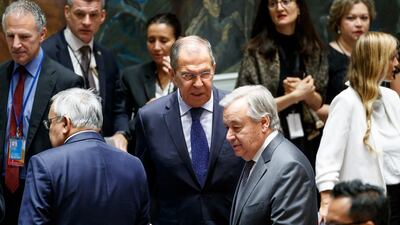If flattery of US President Donald Trump was the currency of the UN General Assembly gathering last week, India’s Narendra Modi came to the US with a bulging wallet.
Starting the trip with a rally for overseas Indians in Houston, Mr Modi invited along Mr Trump. The president was at his most jubilant last week when retweeting footage of the packed arena.
Populists, it turns out, like to appear popular. UNGA began as self-proclaimed patriots revelled in their true agendas. The week was shaped around what Mr Trump called “conflict between patriotism and globalism”.
A number of countries worked hard to bolster Mr Trump's popularity. At a press conference in Manhattan’s Intercontinental hotel, he claimed a record number of bilateral meetings.
Whether that was true or not, the US president certainly brought the court of King Donald to the city where he grew up. Trade deals were promised, and signed with British and Japanese leaders.
Yet the pictures from those meetings soon came to symbolise the president’s own political woes.
Alongside British Prime Minister Boris Johnson, the two men were pugilistic in the face of the blows landing on them. Mr Johnson had just suffered a Supreme Court judgment voiding his suspension of the UK parliament. Hours later, Mr Trump was to learn that a whistleblower complaint had triggered a House of Representatives impeachment inquiry into his conduct.
By the time that Mr Trump met the Ukrainian leader – the man on the other end of the contentious phone call that triggered the alarm – there was plenty of ill will in the air. "I don't want to get involved," pleaded Ukrainian President Volodymyr Zelenskiy.
Speeches at the UN podium were overshadowed by the dramas on the sidelines. Speakers addressed divisions over the globalism of the UN system. A representative of Austria’s technocratic government attempted to caution the nationalists that their governments needed worldwide follow-through.
Indeed, Mr Trump himself had displayed this by hosting a summit on religious freedom on Monday, an event addressed by Antonio Guterres, the UN secretary general.
Mr Guterres' priority on Monday, however, was the Climate Action Summit. Here the limelight was stolen by Swedish teenager Greta Thunberg. Mr Trump only put in an appearance to show support for Mr Modi.
The changing nature of politics around the world has forced Mr Guterres to abandon the idea of the secretary general as a broker of deals. Hours of shuttle diplomacy attempting to close the gap in times of crisis are not for him. Peacemaking in conflicts does not appear to take up much of his energy. Nor do set-piece interventions at the UN Security Council seeking to deliver the heft of the international community.
Instead, he appears to have pared his work down to two approaches. The first is to latch onto global campaigns. This year, the climate crisis; last year, refugees and migration.
The second tool is the deployment of international envoys to deliver breakthroughs. Geir Pedersen, the UN's Syria envoy, announced a long-touted constitutional committee.
The UN was silent on the escalating Iran crisis. That left French President Emmanuel Macron to wage an intense campaign to broker a meeting between Mr Trump and Iranian President Hassan Rouhani. Despite the two men sitting just a few feet apart, Mr Macron was rebuffed by Mr Rouhani. It was the abysmal failure of the week.
Ghassan Salame, the UN's Libya envoy, was marginalised. Having talked about re-engaging in direct talks, Fayez Al Sarraj, the leader of the Government of National Accord, backed away. His podium speech rejected talks with Field Marshal Khalifa Haftar.
Dozens of panels, contact groups, conferences and bilateral meetings saw officials, stakeholders and politicians trying to secure incremental agreements. Issues like rehabilitating Sudan went well. An eight-point statement from an expanded support group on Yemen promised beefed-up support for Martin Griffiths, the UN's Yemen envoy.
Banks and finance houses came together to adopt the UN as a platform for addressing climate change. Mr Guterres' efforts to open up the UN as a vehicle for wider engagement with the private sector and campaigners has taken on real significance.
None of this means that progress towards the UN’s sustainable development goals is on track. Indeed a raft of reports issued during the week showed that the prospect of achieving the 17 objectives by 2030 is ebbing away.
There is no doubt this is because governments are not doing enough either at national level or on the basis of collective action.
Some politicians schooled in the traditions of post-Cold War centrism point the figure of blame at populists.
European Council President Donald Tusk used his final turn at the podium to lash out at the rise of “fake leaders” using false and dangerous arguments for power.
The problem is leaders such as Mr Tusk have not delivered on ambitious targets they previously set and signed.
It is not surprising that a new set of leaders now ride roughshod over this global order. Mr Trump has moulded UNGA around his politics. The UN system is scrambling as it adapts.
Damien McElroy is the London bureau chief for The National


